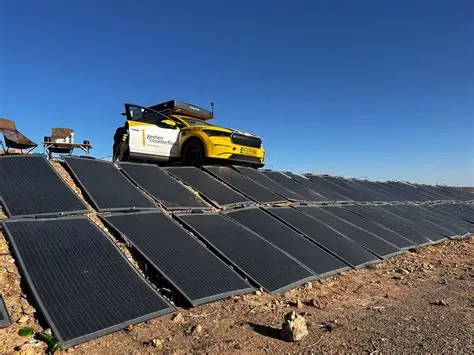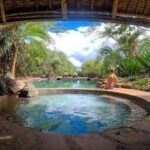🌞 Solar-Powered Safari: The Rise of Green Energy in Kenya’s Wild
In the heart of Africa’s wilderness, a quiet revolution is taking place. Kenya long celebrated for its breathtaking safaris and rich biodiversity is now leading the way in sustainable travel. A new era has dawned: the solar-powered safari, where the sun fuels not just adventure, but also conservation.
⚡ Harnessing the Power of the Sun
Kenya enjoys abundant sunshine year-round, making it an ideal hub for solar innovation. Safari lodges and camps across the country are increasingly turning to solar energy to power their operations. From luxurious tented camps in the Maasai Mara to eco-lodges in Samburu and Amboseli, clean energy is replacing diesel generators that once filled the air with noise and emissions.
Solar power now runs lights, fridges, water pumps, and even electric safari vehicles. The result? A quieter, cleaner, and more immersive wildlife experience — one where guests hear lions roar and birds sing, instead of generator hums in the background.
🌍 Eco-Conscious Comfort in the Wild
Contrary to the old myth that “Eco” means “basic,” modern solar-powered lodges redefine sustainable luxury. Think hot showers heated by the sun, gourmet meals prepared in solar-powered kitchens, and Wi-Fi powered by off-grid systems.
Places like Campi ya Kanzi, Basecamp Explorer, and Lentorre Lodge are proof that environmental responsibility and comfort can coexist beautifully. Many have installed solar panels on rooftops and integrated battery systems that store enough energy to run entire facilities day and night.
By reducing reliance on fossil fuels, these lodges not only lower operating costs but also minimize their ecological footprint a win for both business and biodiversity.
🦓 Powering Conservation with Clean Energy
The benefits of Kenya’s solar revolution go far beyond the camps. Solar energy supports wildlife conservation in tangible ways.
Solar-powered electric fences help keep elephants and livestock safely apart, reducing human wildlife conflict. Solar lights deter poachers in remote areas, while solar-powered boreholes provide clean water for communities and animals alike during the dry season.
Organizations such as The Mara Elephant Project and Ol Pejeta Conservancy are at the forefront of using green energy for anti-poaching operations, water management, and research stations. Every watt generated from the sun helps protect the very landscapes that make Kenya’s safaris so magical.
🌿 A Sustainable Future for Tourism
Tourism is one of Kenya’s most vital industries and one of the most vulnerable to climate change. Rising temperatures, changing rainfall patterns, and drought threaten both wildlife and livelihoods. By embracing solar power, Kenya’s tourism industry is showing the world that sustainability and success go hand in hand.
Travelers are increasingly choosing Eco-friendly options. Solar-powered camps not only appeal to conscious tourists but also enhance Kenya’s image as a global leader in responsible tourism.
☀️ How You Can Support the Movement
As a traveler, your choices matter. Here’s how you can contribute to the solar safari movement:
-
Book Eco-certified lodges that use renewable energy.
-
Travel light and reduce your plastic waste.
-
Offset your carbon footprint by supporting reforestation or conservation programs.
-
Share your experience to inspire others to choose green travel options.
Each small action helps ensure that future generations can enjoy Kenya’s wild beauty just as we do today.
🌅 The Road Ahead
Kenya’s solar-powered safari movement is more than just a travel trend it’s a vision for the future. A future where luxury travel coexists with conservation, and where the African sun powers not only our adventures but also our hope for a greener planet.
So the next time you plan your safari, remember: the sun doesn’t just rise over Kenya’s Savannah it’s lighting the path toward a sustainable tomorrow.


